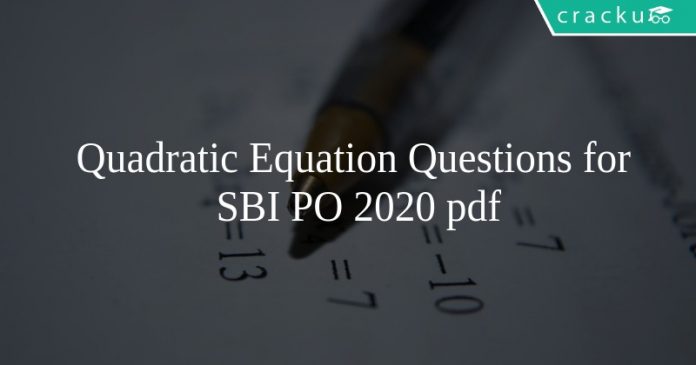Quadratic Equation Questions for SBI PO 2020 pdf
Download SBI PO Quadratic Equation Questions & Answers PDF for SBI PO Prelims and Mains exam. Very Important SBI PO Quadratic Equation Questions with solutions.
Download Quadratic Equation Questions for SBI PO 2020 pdf
105 SBI PO mocks for Rs. 199. Enroll here
Instructions
In each of these question two equations I & II with variables a & b are given You have to solve both the equations to find the values of a & b
Mark answer if
a) a<b
</b
<b
</b
<b
b) $a\leq b$
c) relationship between a & b cannot be established
d) a>b
e) $a\geq b$
Question 1: I.$2a^{2}+a-1=0$
II.$12b^{2}-17b+6=0$
a) $a<b$
b) $a\leq b$
c) Relationship between $a$ & $b$ cannot be established
d) $a>b$
e) $a\geq b$
Question 2: I.$a^{2}-5a+6=0$
II. $2b^{2}-13b+21=0$
a) $a<b$
b) $a\leq b$
c) Relationship between $a$ & $b$ cannot be established
d) $a>b$
e) $a\geq b$
Question 3: Consider the following statements:
A.Sachin received 2/9 of what Saurav and Viru together received.
B.Saurav received 3/11 of what Sachin and Viru together received.
Among Sachin, Saurav and Viru, who received the minimum amount?
a) Statement A alone is sufficient to answer the question, but not B
b) Statement B alone is sufficient to answer the question, but not A
c) Both statements together are sufficient to answer the question but not independently
d) Both statements together are not sufficient to answer the question.
Instructions
In each of these question two equations I & II with variables a & b are given You have to solve both the equations to find the values of a & b
Mark answer if
a) a<b
</b
<b
</b
<b
b) $a\leq b$
c) relationship between a & b cannot be established
d) a>b
e) $a\geq b$
Question 4: I.$16a^{2}=1$
II.$3b^{2}+7b+2=0$
a) $a<b$
b) $a\leq b$
c) Relationship between $a$ & $b$ cannot be established
d) $a>b$
e) $a\geq b$
Question 5: What is the remainder when $19^{100}$ is divided by 360?
a) 0
b) 1
c) 4
d) 18
Download SBI PO Previous Papers PDF
Instructions
In each of the following question two equations are given you have to solve them and
Give answer (a)if p<q
</q
Give answer (b)if p>q
Give answer (c)if $p\leq$q
Give answer(d)if $p\geq$q
Give answer (e)if p=q
Question 6: I.$p^{2}-7p=-12$
II.$q^{2}-3q+2=0$
a) if p<q
b) if p>q
c) if $p\leq$q
d) if $p\geq$q
e) if p=q
Question 7: I. $12p^{2}-7p=-1$
II. $6q^{2}-7q+2=0$
a) if $p < q$
b) if $p > q$
c) if $p\leq q$
d) if $p\geq q$
e) if $p = q$
Question 8: I.$p^{2}+12p+35=0$
II.$2q^{2}+22q+56=0$
a) if p < q
b) if p>q
c) if $p \leq q$
d) if $p\geq q$
e) if p=q or no relationship can be established
Question 9: I.$p^{2}-8p+15=0$
II.$q^{2}-5q=-6$
a) if p < q
b) if p>q
c) if $p\leq q$
d) if $p\geq q$
e) if p=q
Question 10: I.$2p^{2}+20p+50=0$
II.$q^{2}=25$
a) if p<q
b) if p>q
c) if $p \leq q$
d) if $p\geq q $
e) if p = q
Instructions
For the two given equations I and II—-
Question 11: I. $6p^{2}+5p+1=0$
II. $20q^{2}+9q=-1$
a) Give answer (A) if p is greater than q.
b) Give answer (B) if p is smaller than q.
c) Give answer (C) if p is equal to q.
d) Give answer (D) if p is either equal to or greater than q.
e) Give answer (E) if p is either equal to or smaller than q.
Question 12: I. $3p^{2}+2p-1=0$ II. $2q^{2}+7q+6=0$
a) Give answer (A) if p is greater than q.
b) Give answer (B) if p is smaller than q.
c) Give answer (C) if p is equal to q.
d) Give answer (D) if p is either equal to or greater than q.
e) Give answer (E) if p is either equal to or smaller than q.
Question 13: I. $3p^2+15p=-18$ II. $q^2+7q+12=0$
a) Give answer (A) if p is greater than q.
b) Give answer (B) if p is smaller than q.
c) Give answer (C) if p is equal to q.
d) Give answer (D) if p is either equal to or greater than q.
e) Give answer (E) if p is either equal to or smaller than q.
Question 14: I. $p=\frac{\sqrt{4}}{\sqrt{9}}$ II. $9q^{2}-12q+4=0$
a) Give answer (A) if p is greater than q.
b) Give answer (B) if p is smaller than q.
c) Give answer (C) if p is equal to q.
d) Give answer (D) if p is either equal to or greater than q.
e) Give answer (E) if p is either equal to or smaller than q.
Question 15: I. $p^{2}+13p+42=0$ II. $q^{2}=36$
a) Give answer (A) if p is greater than q.
b) Give answer (B) if p is smaller than q.
c) Give answer (C) if p is equal to q.
d) Give answer (D) if p is either equal to or greater than q.
e) Give answer (E) if p is either equal to or smaller than q.
Instructions
In these questions, two equations numbered I and II are given. You have to solve both the equations and select the appropriate option.
Question 16: I. $2x^{2}+19x+45=0$
II. $2y^{2}+11y+12=0$
a) x = y
b) x> y
c) x < y
d) relationship between xand y cannot be determined
e) x + y
Question 17: I. $3x^{2}-13x+12=0$
II. $2y^{2}-15y+28=0$
a) x> y
b) x= y
c) x < y
d) relationship between x and y cannot be determined
e) x≤ y
Question 18: I. $x^{2}=16$
II. $2y^{2}-17y+36=0$
a) x > y
b) x > y
c) x < y
d) relationship between x and y cannot be determined
e) $x \leq y$
Question 19: I. $6x^{2}+19x+15=0$
II. $3y^{2}+11y+10=0$
a) x = y
b) x > y
c) x < y
d) $x \geq y$
e) $x \leq y$
Question 20: I. $2x^{2}-11x+15=0$
II. $2y^{2}-11y+14=0$
a) x > y
b) x> y
c) x < y
d) relationship between x and y cannot be determined
e) x ≤ y
Instructions
In the following questions two equations numbered I and
II are given. You have to solve both the equations and
a: if x > y
b: if x ≥ y
c: if x < y
d: if x ≤ y
e: if x = y or the relationship cannot be established.
Question 21: I. $x^{2}+x-12=0$
II. $y^{2}+2y-8=0$
a) if x > y
b) if x ≥ y
c) if x < y
d) if x ≤ y
e) if x = y or the relationship cannot be established.
Answers & Solutions:
1) Answer (A)
$2a^{2}+a-1=0$
We get the factor as:
a=-1, a=0.5
$12b^{2}-17b+6=0$
Solving, we get the factor as,
b= 1.5, b= .75
Hence, b>a
Option A is correct option.
2) Answer (B)
Soving the quadratic equations we get,
$a^{2}-5a+6=0$
i.e (a-2)(a-3)=0
i.e a=2, a=3
$2b^{2}-13b+21=0$
i.e (b-3.5)(b-3)=0
i.e b= 3.5 and b=3
Hence, we can deduce that $a\leq b$
Therefore, option B is correct.
3) Answer (C)
From statement 1 alone, we do not know if Saurav or Viru has got less than Sachin, from statement 2 alone we cannot know if Sachin or Viru got less than Saurav. Let the total number of quantities be 9*11*14 = 1386. From statement 1, we know that Sachin received 252 quantities. From 2, we know that Saurav received 287 quantities. Therefore, from both the statements, we know that Sachin received the least amount (though we do not know the absolute value of the quantity received, we can still answer the question ).
4) Answer (D)
$16a^{2}=1$
Solving we get, a=-.25, a=+.25
$3b^{2}+7b+2=0$
Solving we get, b= -2. b = -1/3
Hence, a>b. Option D is correct.
5) Answer (B)
We know that when $19^2$ =361 is divided by 360 the remainder is 1. Hence, $19^{100} = 19^2 * 19^2 . . . 50$ times .
Hence the remainder is Rem (1*1*1. . . 50 times)/361 = 1.
6) Answer (B)
$p^2-7p+12 = 0$
$(p-3)(p-4) = 0$
$p = 3, 4$
$q^2-3q+2 = 0$
$(q-1)(q-2) = 0$
$q = 1, 2$
$\therefore p > q$
7) Answer (A)
$12p^2-7p+1 = 0$
$(4p-1)(3p-1) = 0$
$p = \frac{1}{3}, \frac{1}{4}$
$6q^2-7q+2 = 0$
$(2q-1)(3q-2) = 0$
$q = \frac{1}{2}, \frac{2}{3}$
$\therefore p < q$
8) Answer (E)
$p^2+12p+35 = 0$
$(p+5)(p+7) = 0$
$p = -5, -7$
$2q^2+22q+56 = 0$
$q^2+11q+28 = 0$
$(q+4)(q+7) = 0$
$q = -4, -7$
As we can see $p$ can be greater than, less than or equal to $q$. No relationship can be established between $p$ and $q$ and hence, option E is the right answer.
9) Answer (D)
$p^2-8p+15 = 0$
$(p-3)(p-5) = 0$
$p = 3, 5$
$q^2-5q+6 = 0$
$(q-2)(q-3) = 0$
$q = 2, 3$
$p\geq q$
10) Answer (C)
$2p^2+20p+50 = 0$
$p^2+10p+25 = 0$
$(p+5)^2 = 0$
$p = -5$
$q^2 = 25$
$q = 5, -5$
$p\leq q$
11) Answer (B)
$6p^2+5p+1 = 0$
$(2p+1)(3p+1) = 0$
$p = -\frac{1}{2}, -\frac{1}{3}$
$20q^2+9q+1 = 0$
$(4q+1)(5q+1) = 0$
$q = -\frac{1}{4}, -\frac{1}{5}$
$p < q$
12) Answer (A)
$3p^2+2p-1 = 0$
$(3p-1)(p+1) = 0$
$p = -1, \frac{1}{3}$
$2q^2+7q+6 = 0$
$(2q+3)(q+2) = 0$
$q = -2, -\frac{3}{2}$
p > q
13) Answer (D)
$3p^2+15p+18 = 0$
$p^2+5p+6 = 0$
$(p+2)(p+3) = 0$
$p = -3, -2$
$q^2+7q+12 = 0$
$(q+4)(q+3) = 0$
$q = -4, -3$
$p\geq q$
14) Answer (C)
$p = \frac{\sqrt{4}}{\sqrt{9}}$
$p = \frac{2}{3}$
$9q^2-12q+4 = 0$
${(3q-2)}^2 = 0$
$q = \frac{2}{3}$
p = q
15) Answer (E)
$p^2+13p+42 = 0$
$(p+6)(p+7) = 0$
$p = -6, -7$
$q^2 = 36$
$q = -6, 6$
$p\leq q$
16) Answer (C)
$2x^2+19x+45 = 0$
$(2x+9)(x+5) = 0$
$x = -5, -\frac{9}{2}$
$2y^2+11y+12 = 0$
$(2y+3)(y+4) = 0$
$y = -4, -\frac{3}{2}$
x < y
17) Answer (C)
$3x^2-13x+12 = 0$
$(3x-4)(x-3) = 0$
$x = \frac{4}{3}, 3$
$2y^2-15y+28 = 0$
$(2y-7)(y-4) = 0$
$y = \frac{7}{2}, 4$
x < y
18) Answer (E)
$x^2 = 16$
$x = 4, -4$
$2y^2-17y+36 = 0$
$(2y-9)(y-4) = 0$
$y = \frac{9}{2}, 4$
$x \leq y$
19) Answer (D)
$6x^2+19x+15 = 0$
$(3x+5)(2x+3) = 0$
$x = -\frac{5}{3}, -\frac{3}{2}$
$3y^2+11y+10 = 0$
$(3y+5)(y+2) = 0$
$y = -\frac{5}{3}, -2$
$x\geq y$
20) Answer (D)
$2x^2-11x+15 = 0$
$(2x-5)(x-3) = 0$
$x = 3, \frac{5}{2}$
$2y^2-11y+14 = 0$
$(2y-7)(y-2) = 0$
$y = 2, \frac{7}{2}$
relationship between x and y cannot be established
21) Answer (E)
$x^2+x-12 = 0$
$(x-3)(x+4) = 0$
$x = -4, 3$
$y^2+2y-8 = 0$
$(y-2)(y+4) = 0$
$y = -4, 2$
Hence, a relationship can not be established between $x$ and $y$
105 SBI PO mocks for Rs. 199. Enroll here
Download SBI Free Preparation App
We hope this Quadratic Equation Questions & Answers PDF of SBI PO is very Useful for preparation of SBI PO Exams.





![How To Manage Time In CAT Exam? [Section-wise Tips] How to manage time in CAT exam ?](https://cracku.in/blog/wp-content/uploads/2018/09/fig-03-09-2018_10-54-46-218x150.jpg)